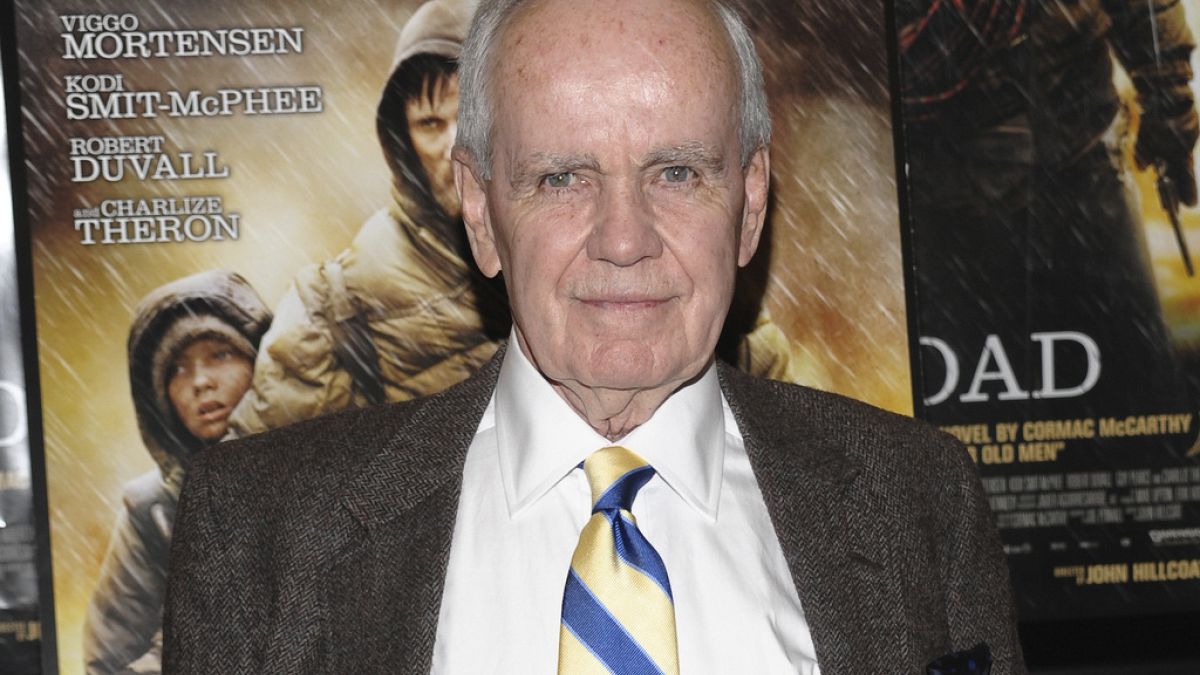The celebrated American author Cormac McCarthy has died at his home in New Mexico. He was best known for the Pulitzer Prize winning post-apocalyptic novel, 'The Road' and 'No Country for Old Men'.
Tributes have been paid to the acclaimed US author Cormac McCarthy who has died of natural causes at his home in Sante Fe, New Mexico. He was 89.
He won a Pulitzer Prize in 2007 for 'The Road' and rarely gave interviews but was one of America's most celebrated writers.
McCarthy's own story was one of belated, and continuing, achievement and popularity after making his commercial breakthrough in 1992 with "All the Pretty Horses".
During the next 15 years he won the National Book Award and the Pulitzer, was a guest on Oprah Winfrey's TV show. His fame increased even more after she chose 'The Road' for her book club. McCarthy's novel "No Country for Old Men" was also adapted by the Coen brothers into an Oscar-winning movie.
Fans of the Coens would discover that the film's terse, absurdist dialogue, so characteristic of the brothers' work, was lifted straight from the novel.
"For 60 years, he demonstrated an unwavering dedication to his craft, and to exploring the infinite possibilities and power of the written word," Penguin Random House CEO Nihar Malaviya said in a statement.
"Millions of readers around the world embraced his characters, his mythic themes, and the intimate emotional truths he laid bare on every page, in brilliant novels that will remain both timely and timeless, for generations to come."
Post-apocalyptic prose
"The Road," his stark tale of a father and son who roam a ravaged landscape, brought him his widest audience and highest acclaim.
In his Winfrey interview, McCarthy said that while typically he didn't know what generates the ideas for his books, he could trace "The Road" to a trip he took with his young son to El Paso, Texas, early in the decade. Standing at the window of a hotel in the middle of the night as his son slept nearby, he started to imagine what El Paso might look like 50 or 100 years in the future.
"I just had this image of these fires up on the hill ... and I thought a lot about my little boy," he said.
He told Winfrey he didn't care how many people read "The Road."
"You would like for the people that would appreciate the book to read it. But, as far as many, many people reading it, so what?" he said.
McCarthy dedicated the book to his son, John Francis, and said having a child as an older man "forces the world on you, and I think it's a good thing." The Pulitzer committee called his book "the profoundly moving story of a journey."
"It boldly imagines a future in which no hope remains, but in which the father and his son, 'each the other's world entire,' are sustained by love," the citation read in part. "Awesome in the totality of its vision, it is an unflinching meditation on the worst and the best that we are capable of: ultimate destructiveness, desperate tenacity, and the tenderness that keeps two people alive in the face of total devastation."
After "The Road," little was heard from McCarthy over the next 15 years and his career was presumed over. But in 2022, Knopf made the startling announcement that it would release a pair of connected novels he had referred to in the past: "The Passenger" and "Stella Maris," narratives about a brother and sister, mutually obsessed siblings, and the legacy of their father, a physicist who had worked on atomic technology. "Stella Maris" was notable, in part, because it centered on a female character, an acknowledged weakness of McCarthy's.
"I don't pretend to understand women," he told Winfrey.
McCarthy, raised in Knoxville, Tennessee, was compared to William Faulkner for his expansive, Old Testament style and rural settings. McCarthy's themes, like Faulkner's, often were bleak and violent and dramatised how the past overwhelmed the present.
Across stark and forbidding landscapes and rundown border communities, he placed drifters, thieves, prostitutes and old, broken men, all unable to escape fates determined for them well before they were born. As the doomed John Grady Cole of McCarthy's celebrated "Border" trilogy would learn, dreams of a better life were only dreams, and falling in love an act of folly.
"Every man's death is a standing in for every other," McCarthy wrote in "Cities of the Plain," the trilogy's final book. "And since death comes to all there is no way to abate the fear of it except to love that man who stands for us."
His first novel, "The Orchard Keeper" — written in Chicago while he was working as an auto mechanic — was published by Random House in 1965. His editor was Albert Erskine, Faulkner's longtime editor.
Other novels include "Outer Dark," published in 1968; "Child of God" in 1973; and "Suttree" in 1979. The violent "Blood Meridian," about a group of bounty hunters along the Texas-Mexico border murdering Indians for their scalps, was published in 1985.
His "Border Trilogy" books were set in the Southwest along the border with Mexico: "All the Pretty Horses" (1992) — a National Book Award winner that was turned into a feature film; "The Crossing" (1994), and "Cities of the Plain" (1998).



